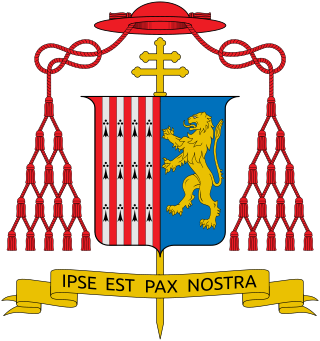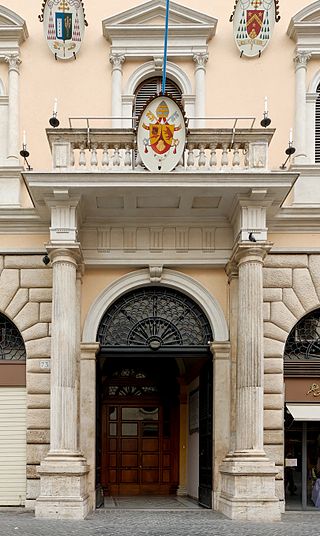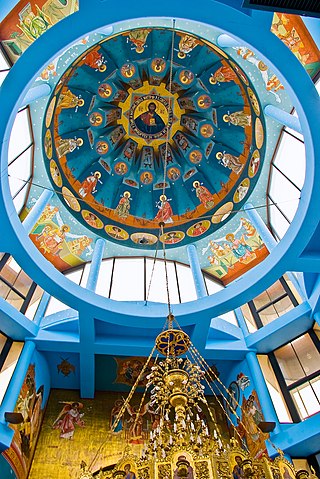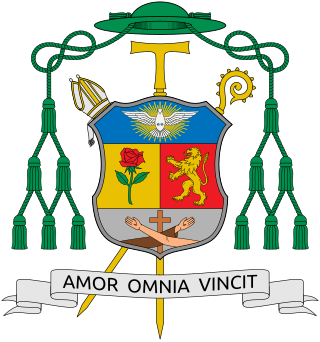
Ivan Cornelius Dias was an Indian cardinal of the Roman Catholic Church. He was Prefect of the Congregation for the Evangelization of Peoples from 2006 to 2011, Archbishop of Bombay from 1996 to 2006, and before that a papal ambassador in the Balkans, East Asia, and West Africa. He was elevated to the rank of cardinal in 2001.
Stephen Fumio Hamao was a Japanese cardinal of the Roman Catholic Church and was the president of the Pontifical Council for the Pastoral Care of Migrants and Itinerants until it merged with other elements of the Roman Curia. He was made a cardinal by Pope John Paul II in 2003.
The Passionists, officially named the Congregation of the Passion of Jesus Christ, abbreviated CP, are a Catholic clerical religious congregation of pontifical right for men, founded by Paul of the Cross in 1720, with a special emphasis on and devotion to the Passion of Jesus Christ. A known symbol of the congregation is the labeled emblem of the Sacred Heart of Jesus, surmounted by a cross and is often sewn into the attire of its congregants.

Jorge María Mejía was an Argentine cardinal of the Catholic Church.

Duraisamy Simon Lourdusamy was an Indian cardinal of the Catholic Church. He was the Prefect of the Congregation for the Oriental Churches in the Roman Curia and was elevated to the cardinalate in 1985. His episcopical motto was Aedificare domum Dei which means "To build the house of God". He was the fourth cardinal from India and the first curial cardinal of Asia outside of the Middle East.
Joseph Mark McShea was an American prelate of the Roman Catholic Church. He served as the first bishop of the Diocese of Allentown in Pennsylvania from 1961 to 1983.

The St Paul of the Cross Cathedral is a Roman Catholic cathedral in the city of Rousse in northeastern Bulgaria. It is the cathedral church of the Nikopol diocese and it is dedicated to Saint Paul of the Cross, founder of the Passionists.

Paolo Bertoli was an Italian Roman Catholic Cardinal and Prefect of the Congregation for the Causes of Saints.

Baron Maximilian Louis Hubert Egon Vincent Marie Joseph von Fürstenberg-Stammheim was a cardinal of the Roman Catholic Church and was Prefect of the Congregation for the Oriental Churches.

Inocencio of Mary Immaculate , born Manuel Canoura Arnau, was a priest and member of the Passionist Congregation and was killed during the Asturias revolt. He and his companions are known collectively as the Martyrs of Turon. He was canonised by Pope John Paul II in 1999.
Orientales ecclesias is an encyclical of Pope Pius XII concerning the persecution of the Eastern Catholic Churches and describing the desperate situation of the faithful in Bulgaria.

Peter Vitchev, also known as Kamen Vitchev, was a Bulgarian Eastern Catholic and an Assumptionist priest who was martyred by the Bulgarian communist regime. He was beatified by Pope John Paul II on 2002.

The Roman Colleges, also referred to as the Pontifical Colleges in Rome, are institutions established and maintained in Rome for the education of future ecclesiastics of the Catholic Church. Traditionally many were for students of a particular nationality. The colleges are halls of residence in which the students follow the usual seminary exercises of piety, study in private, and review the subjects treated in class. In some colleges there are special courses of instruction but the regular courses in philosophy and theology are given in a few large central institutions, such as Pontifical Urbaniana University, the Pontifical Gregorian University, the Pontifical Lateran University, and the Pontifical University of Saint Thomas Aquinas, Angelicum.

Eastern Catholic victims of Soviet persecutions include bishops and others among the tens of thousands of victims of Soviet persecutions from 1918 to approximately 1980, under the state ideology of Marxist–Leninist atheism.
The history of the Roman Curia, the administrative apparatus responsible for managing the affairs of the Holy See and the Catholic Church, can be traced to the 11th century when informal methods of administration began to take on a more organized structure and eventually a bureaucratic form. The Curia has undergone a series of renewals and reforms, including a major overhaul following the loss of the Papal States, which fundamentally altered the range and nature of the Curia's responsibilities, removing many of an entirely secular nature.
Robert-Matthew Chichkov in Plovdiv, Bulgaria, was a priest, rector and teacher who was sentenced to death in the early 1950s. He venerate as blessed by the Catholic Church.

Petko Jordanov Christov, O.F.M.Conv. was a Bulgarian Roman Catholic prelate, who served as a bishop of the Roman Catholic Diocese of Nicopolis.

Berhaneyesus Demerew Souraphiel, CM is an Ethiopian prelate of the Ethiopian Catholic Church, which he has headed since his election as Ethiopian Catholic Archbishop of Addis Abeba in 1999. He is also the chancellor of the Catholic University of Eastern Africa and the president of the Catholic Bishops’ Conference of Ethiopia and Eritrea. He was elevated to the rank of cardinal by Pope Francis in 2015.

Miguel Ángel Ayuso Guixot, MCCJ is a Spanish prelate of the Catholic Church and an historian of Islam. He has been an official of the Roman Curia since 2012 and an archbishop since 2016.

Strahil Kavalenov is a Bulgarian Catholic clergyman and the current bishop of the Nicopolis.














